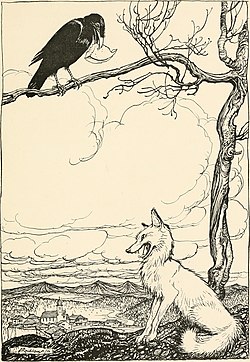Fabel
- För andra betydelser, se fabel (olika betydelser).

En fabel är en kort och allegorisk berättelse med uppdiktat innehåll. I de olika rollerna finns förmänskligade djur, och handlingen syftar i regel på en sensmoral. Exempel på sensmoralen i fabler är "den som gapar efter mycket mister ofta hela stycket".[1]
I Sverige känd från barnprogrammet Fablernas värld.
Fabelberättande är av gammalt datum och förekommer i olika delar av världen.[1] Den har kommit till användning inom olika typer av litteratur (se fabeldjursserie), samt inom animerad film. Walt Disneys film- och serieskapelser har djurfabelns antromorfiserade djur som grund.
I fabler är antropomorfism ett utmärkande tema, det vill säga djur, växter eller föremål kan tala och uppföra sig som människor. Man använder djurs tillskrivna egenskaper, det vill säga ugglan är klok, räven listig, tigern modig och så vidare.
Från allra första början berättades fablerna muntligt. Efter hand skrevs de ner och förändrades då lite. En känd fabelsamlare var greken Aisopos som levde på 500-talet f.Kr. Han var en puckelryggad slav som var först med att skriva ner fablerna. Han berättade sagor om fångvaktarna och beskrev vad de gjorde fel. Men för att inte råka illa ut, gjorde han om figurerna till djur.
Fransmannen Jean de La Fontaine, som levde på 1600-talet, skrev fabler på vers.
Ordet "fabel" kommer från latinets fabula (betonas på första stavelsen), som betyder "berättelse", "saga" eller "anekdot".[1]
Fabel eller fabula är också en narratologisk term som ungefär betyder "händelseförloppet i kronologisk ordning." I en sådan specificeras varken personernas namn, platsen där berättelsen utspelar sig, eller tiden när den utspelar sig.
Kända fabler
Se även
- Fabeldjur
- Lego Fabuland
Referenser
- ^ [a b c] ”fabel”. ne.se. https://www.ne.se/uppslagsverk/encyklopedi/l%C3%A5ng/fabel. Läst 5 februari 2019.
Externa länkar
Media som används på denna webbplats
Författare/Upphovsman: Internet Archive Book Images, Licens: No restrictions
Identifier: aesopsfables00aeso (find matches)
Title: Aesop's fables
Year: 1912 (1910s)
Authors: Aesop Vernon Jones, V. S. (Vernon Stanley) Rackham, Arthur, 1867-1939, ill
Subjects: Fables
Publisher: London : Heinemann New York : Doubleday, Page
Contributing Library: New York Public Library
Digitizing Sponsor: MSN
View Book Page: Book Viewer
About This Book: Catalog Entry
View All Images: All Images From Book
Click here to view book online to see this illustration in context in a browseable online version of this book.
Text Appearing Before Image:
ith a piece-^^^ of cheese in her beak when a Fox observed herand set his wits to work to discover some way of gettingthe cheese. Coming and standing under the tree helooked up and said, * What a noble bird I see above me !Her beauty is without equal, the hue of her plumageexquisite. If only her voice is as sweet as her looksare fair, she ought without doubt to be Queen of theBirds. The Crow was hugely flattered by this, andjust to show the Fox that she could sing she gave aloud caw. Down came the cheese, of course, and theFox, snatching it up, said, You have a voice, madam,I see : what you want is wits. THE HORSE AND THE GROOM I HERE was once a Groom who used to spend long^ hours clipping and combing the Horse of whichhe had charge, but who daily stole a portion of hisallowance of oats, and sold it for his own profit. TheHorse gradually got into worse and worse condition,and at last cried to the Groom, If you really wantme to look sleek and well, you must comb me less andfeed me more.
Text Appearing After Image:
THE FOX AND THE CROW THE WOLF AND THE LAMB A WOLF came upon a Lamb straying from the^~^ flock, and felt some compunction about takingthe life of so helpless a creature without some plausibleexcuse ; so he cast about for a grievance and said atlast, Last year, sirrah, you grossly insulted me. That is impossible, sir, bleated the Lamb, for Iwasnt born then. Well, retorted the Wolf, youfeed in my pastures. That cannot be, replied theLamb, for I have never yet tasted grass. Youdrink from my spring, then, continued the Wolf.Indeed, sir, said the poor Lamb, I have never yetdrunk anything but my mothers milk. Well, anyhow,said the Wolf, Im not going without my dinner :and he sprang upon the Lamb and devoured it withoutmore ado. THE PEACOCK AND THE CRANE A PEACOCK taunted a Crane with the dullness of^^* her plumage. Look at my brilliant colours,said she, and see how much finer they are than yourpoor feathers. I am not denying, replied theCrane, that yours are far gayer than mine ; but whenit
Note About Images
